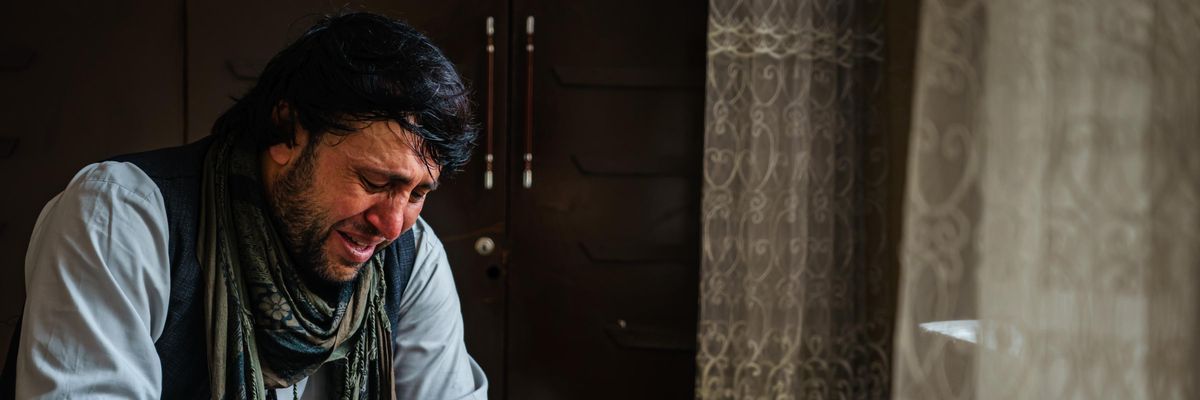Experts on the conduct and consequences of U.S. drone strikes delivered harrowing testimony Wednesday at a Senate Judiciary Committee hearing on two decades of aerial bombardment during the so-called War on Terror.
"If any other country launched this program, we would rightly call it an unlawful, extrajudicial, and arbitrary use of force."
"Our nation is at a turning point," Senate Judiciary Committee Chair Dick Durbin (D-Ill.) said upon opening the hearing. "In the months after 9/11 we strayed from our values, engaging in torture and indefinite detention at Guantanamo, which continues."
"We also began conducting lethal strikes in unprecedented ways," he continued, later acknowledging the tens of thousands of men, women, and children killed U.S. airstrikes in at least half a dozen nations over the past 20-plus years.
Sen. Chuck Grassley of Iowa, the ranking Republican on the committee, was dismissive of the proceeding, instead expressing concern for "the growing spike in violent crime, including murders and attacks on police" in the United States.
"But the order of the day by the majority is drones," he added, before calling on witnesses to testify.
The first to do so was Hina Shamsi, director of the ACLU's National Security Project, who said that former presidents George W. Bush and Barack Obama "started using drones strikes in Yemen without Congress or the American public ever even having a conversation about it."
"Successive presidents have unilaterally claimed the power to use secretive war-based rules to kill terrorism suspects in multiple other countries around the world where we were not, or are not, at war," Shamsi continued. "Despite widespread, credible reports of terrible civilian deaths and injuries, and lacking any strategic assessment of costs and consequences, or an end goal, the executive branch has kept expanding this program geographically, and in the categories of groups and people who could be killed based only on a president's say-so."
"The legal justifications are vague and ever-shifting, and virtually no other country agrees with them," she added. "If any other country launched this program, we would rightly call it an unlawful, extrajudicial, and arbitrary use of force. Yet it is a core component of what Americans now call our forever or endless wars."
Shamsi later came under fire from Sen. Lindsey Graham (R-S.C.), who angrily interrupted her while she was attempting to offer a nuanced answer to a question about whether or not al-Qaeda and ISIS would attack the United States if they could.
Testifying after Shamsi, Radhya al-Mutawakel, chair of the Yemen-based group Mwatana for Human Rights, noted that "the United States has been using lethal force in Yemen for nearly two decades. Regardless of which president or party has controlled the White House, the United States has never fully investigated the civilian cost of its operations in Yemen, has never taken sufficient steps to review the efficacy of these operations, and has never provided civilian victims the acknowledgment, apology, and reparations they are owed."
Al-Mutawakel described in graphic detail how men, women, and children "were going about their everyday lives--driving to visit friends, bringing food to their families, sleeping in their homes--when killed or injured" by U.S. drone strikes, which "also caused other forms of deep and long-lasting civilian harm."
Recounting stories shared with Mwatana, she continued:
Family members described grief at the loss of their loved ones. A grandmother fainted after seeing the body of her 17-year-old grandson. A 40-year-old man collapsed after learning his two brothers had been killed. An adult son gathered his mother's remains, while a husband rushed to get his pregnant wife to the hospital, watching her die, accompanied by their nine-year-old son. A mother was found dead, clutching her child. Another mother found her 14-year-old son's body on fire. His father could "not forget [the boy's] younger sisters screaming at the sight."
"U.S. operations take a psychological toll on survivors and on impacted communities," al-Mutawakel added. "A survivor told Mwatana that, while he had recovered physically, he continued to feel helpless and depressed a year and a half after a U.S. strike injured him and killed his younger cousin. A parent explained how children have continuing anxiety after U.S. attacks and can be afraid to be alone: 'My six-year-old son wanted to go to the bathroom but then returned without going. When I asked him the reason, he said, I don't want you all to die without me if the drone hits.' Others drew links between family members' trauma and the deterioration of their physical health."
Furthermore, drone strikes "led to adverse economic effects," al-Mutawakel said, "killing primary breadwinners whose families relied on their incomes, and damaging and destroying important civilian property, including vehicles, homes, and livestock."
Shamsi--an attorney who represents the survivors of an August 29, 2021 drone strike that killed 10 Afghan civilians including seven children as U.S. forces withdrew from Kabul--spoke of fathers who had to "gather up their children's body parts" after aerial attacks.
"My clients' grief is compounded by the fact that, for 19 days, our government kept up false and stigmatizing allegations about their loved ones, wrongly asserting the strike was 'righteous' and 'successful' against ISIS operatives," she said.
"The Pentagon later withdrew those justifications and admitted the strike was a mistake, but the damage is done," she added. "The falsehoods are still widespread in Afghanistan today and my clients remain in daily and imminent danger. Months ago, our government promised to evacuate them. They are still waiting."
Lack of accountability for--or even acknowledgment of--harm done by U.S. drone strikes was a common theme in both Shamsi and al-Mutawakel's testimonies.
Together with the Columbia Law School Human Rights Clinic, Mwatana for Human Rights submitted to the U.S. military detailed reports of a dozen civilian casualty incidents resulting from drone strikes. U.S. Central Command admitted causing harm in just two of the 12 incidents, while claiming "all strikes" targeted "terrorists."
Related Content
'Death Falling From the Sky': Report Spotlights Civilian Harm From US Drone Strikes in Yemen
Brett Wilkins
"In the vanishingly small number of cases in which the U.S. has acknowledged causing civilian harm in Yemen, the U.S. did not offer an apology to the families of those killed," said al-Mutawakel. "Even where the U.S. acknowledged civilian deaths, it did not identify any of the civilians killed by name, age, or gender."
Shamsi ended her testimony with a set of actions U.S. lawmakers can take "to mitigate actual security concerns abroad and at home" and "help pull us out of this endless war-based spiral and its human, legal, and policy costs."
"Twenty years after the U.S. began its secret and unaccountable killings in Yemen, the U.S. should, at long last, change towards a rights-respecting course."
"First, you can use your oversight powers to demand that executive branch officials testify about their legal and policy justifications for using lethal force in countries where Congress did not authorize it, and make public any legal and policy opinions that seek to justify such drastic and extralegal measures," she said.
"Second," Shamsi continued, "use your core Article I power of the purse to deny funding for unauthorized and unlawful use of force."
Finally, she said, the senators should "help restore our constitutional system of checks and balances and reverse the executive branch's power grab on matters of war and peace."
Al-Mutawakel stressed that "20 years after the U.S. began its secret and unaccountable killings in Yemen, the U.S. should, at long last, change toward a rights-respecting course."





